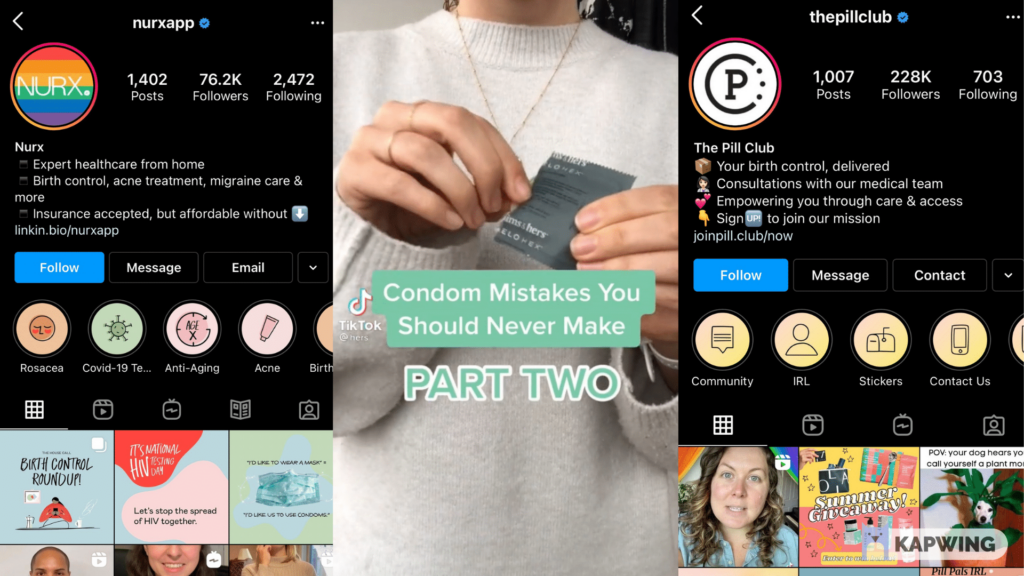“Pregnancies don’t stop for pandemics” is what Dr.Natalia Kanem, the executive director of the United Nations Population Fund (UNFPA), said this past week while discussing the disruptions of contraceptives as a result of the Coronavirus pandemic. A lack of accessibility equals a lack of power to decide, and women need access over their sexual health more than ever amidst the incessant policing of their bodies. Millions of women have lost their access to family planning services and birth control because of the pandemic but, social media has become a revolutionary tool utilized to deliver access — and therefore power, back in the hands of women.

Coronavirus Disproportionately Affects Women and their Sexual Health
The United Nations Population Fund (UNFPA) is a U.N agency specializing in global reproductive health, and their newest study estimates that 12 million women across 115 low to middle-income countries were “unable to access family planning services as a result of the COVID-19 pandemic”. These disruptions lasted on average 3.6 months and resulted in about 1.4 million unplanned pregnancies in 2020.
Maya Bohara, from Nepal, was married at 17 and nursed four children by the time she was 24. Maya and many other women relied on a birth control shot to prohibit them from having any more children. That was until her nearest health center ran out of contraceptive shots during the pandemic. Not long after missing her shot, she became pregnant, and her future changed forever. Unplanned children often create financial strains on families, and this problem was exacerbated as many families were already struggling with other pandemic-related financial burdens.
Hundreds of stories similar to Maya’s happen every day, and that is why Dr.Natalia Kanem and the UNFPA have stated: “severe social and economic impacts of COVID-19 demand intensified action for women and girls.”
Rise in Online Accessibility
Online accessibility to women’s health organizations and birth control providers was present before the start of the pandemic. But, as more and more women were denied access to contraceptives, there was a surge in online birth control prescriptions, SMS services, Apps for women’s health, non-profit women’s organizations, and sexual health education through online platforms and social media.
The Pill Club
This company provides an online birth control delivery system that prescribes and delivers birth control (and goodies!) whether or not you have insurance. With the help of their own medical team, they support over 300,000 patients a year! Their mission is to be a “trusted healthcare partner for women, empowering them through access, choice, and education — all while delivering a positive and personal experience”.

Hers
Hers declares itself a “one-stop shop for women’s health and personal care providing medical-grade solutions for skincare, birth control, and sexual health”. Hers is a telehealth brand that has developed products to solve women’s problems that remain unanswered. They also have built a strong online presence on Instagram and TikTok to educate young girls on sexual health.
ADVERTISEMENT
@hers
SafeBoda
SafeBoda is a ride-hailing app in Uganda to help the compounded issues of supply chain interruptions and transport restrictions because of COVID-19. This service is provided by a collaboration of the UNFPA and SafeBoda with financial support from the Embassy of Sweden in Uganda. An online e-shop is available for users to request items. Then the app identifies the nearest pharmacy and a SafeBoda picks up and delivers the inexpensive, subsidized, or government -provided reproductive health items to the consumer. The app has also waived delivery fees during the pandemic. Users of the app say the service is highly advantageous, “especially [for] things we fear to order over the counter,” said Flora Peace, from Nansana.

Nurx
Nurx is an app, website, and organization that easily and affordably delivers women’s health needs right to their patient’s doors. Founded by Hans Gangeskar and Dr. Edvard Engesæth, the Nurx medical team offers accessibility for birth control, acne treatment, STI testing, HPV Screening, HIV prep, herpes treatments, and many more to provide affordable and accessible healthcare.

SMS Services
In Eswatini, a country in Southern African, A SMS (short messaging system) is provided from a partnership between UNFPA, the World Food Program (WFP), and the health ministries Sexual Reproductive Health Unit. This program sends messages encouraging women to access contraceptives, reminding them to return to their health facility monthly, and providing them with information about food relief. Following a 47 percent drop in family planning services since the start of the pandemic in Eswatini, services like these ensure that “women continue accessing these services [to] mitigate COVID-19’s impact on the health of vulnerable groups like women and girls,” said Margaret Thwala-Tembe, UNFPA’s current head of office in Eswatini.
Bedsider
Also known as Bedsider.org, is an online birth control support network operated by Power to Decide, the campaign to prevent unplanned pregnancy. The website and included resources provide information, answers, and works with Power to Decide to provide access to their contraceptive access fund. This fund offers qualifying low-income communities with access to gas cards, shared ride vouchers for transportation offsets, child care, and reimbursements for costs of contraception that are not covered by insurance.
Facilitating Conversation and Education through Social Media
Dr.Omon Imoho, a sex-positive health educator on TikTok, destigmatizes conversations about sex while teaching viewers about their sexual health. Her content utilizes her MD to focus on women’s health topics including, endometriosis, menopause, female orgasms, and how contracting COVID-19 will affect the use of combined hormonal contraception. This information breaks down barriers to accessing adequate and informative sexual healthcare for women.
ADVERTISEMENT
@dromonimohi What to do if you have #covid19 and are on the combined #contraceptive #oestrogen #pill #teamhalo #learnontiktok #WorkThisWay #SimlishSessions
Some women have even documented their processes doing at-home STI testing to destigmatize STI’s and encourage girls to take action over their sexual health. Influencers and major social media players have more power than they think and can play a huge role in normalizing STI testing and other sexual health services, especially for the LGBTQ+ community and people of color. Millennials have doctoral degrees now and they’re using them to educate the generations to come.
@wouldrathernap Get tested regularly if you’re sexually active???? #nurx #YouShouldKnow #fyp #sti #std #tested #birthcontrol
Another Tiktok user, @nicolecorona__, shared her story of how she acquired a year of free birth control through planned parenthood. Her viral video has garnered a quarter of a million views and spreads awareness of the many resources planned parenthood offers. This type of content is part of the revolution towards accessibility that provides actionable steps for women to take in order to safeguard their reproductive rights.
@nicolecorona__ Thank you @plannedparenthood #birthcontrol #period #brokeaf #latina
There are a plethora of users just like the aforementioned women that are using their platforms to educate others on issues that may be to nerve-wracking to bring up in person. While unnecessary doctors visits are few and far between girls need access to information and many girls have trouble turning to their family and friends about such personal issues. That is where telehealth organizations and Tiktok users come in to answer questions openly and honestly facilitating conversations to girls across the Globe through their phones. Examples include users like @madgethevadge who utilizes easy to use terminology to describe topics girls may be too nervous to bring up.
@madgethevag
Paloma Zuleta, media relations director at the aforementioned organization Power to Decide, believes social media is the key to opening the door of accessibility to young people. She contrasts the safe space of inclusivity, sex-positivity, and sexual health information to the strict, abstinence based sex education taught in school. “Contraception is basic healthcare,” Zuleta said. “It’s not a shade of lipstick. The ability for a woman to decide to have complete autonomy over her reproductive cycle is life changing.”
The Future of Protecting Reproductive Rights
Zulete from Power to Decide, along with many other sexual health professionals believe that while social media is expanding accessibility for women’s healthcare there are still many strides to be made. The aforementioned organizations, apps, and Tiktoks are influential to so many women — however, they are only available to women who have access to phones or the internet. To enact widespread accessibility there needs to be several changes made to the current healthcare system.
1. Allow pharmacists to prescribe birth control
2. Require insurance to cover extended supplies of contraception
3. Protect current contraceptive coverage
These three steps, the increase in women’s telehealth organizations, and the influx of conversation and education through social media are revolutionizing the accessibility that is so desperately needed during this tumultuous time of global unrest and insurgence for women’s reproductive rights. With access comes the power for women to decide for themselves — and it’s their very right to do so.









